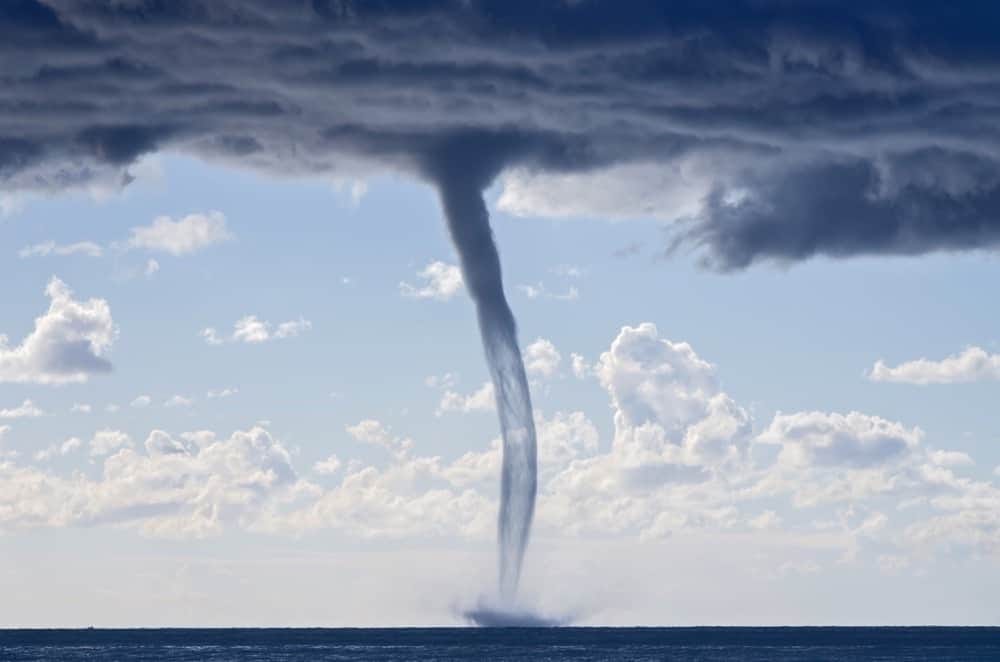The Horizon was wrong
Lessons from a Mexican Anchorage
The horizon was wrong.
A dark, twisting column stretched from cloud to sea, writhing as if it were alive, shredding the surface into white froth. A waterspout. For a moment, Liz and I just stared at each other across the cockpit. No questions, no commentary—just that quiet, shared recognition that everything had changed.
We'd limped into this anchorage twelve hours earlier under sail alone, the engine silent after running out of fuel somewhere in the darkness of Banderas Bay. It was the kind of mistake that made you question everything—how had we not checked the tank before leaving Isla Isolde? But there we were, threading our way past Punta de Mita's rocks by moonlight and radar, ghost-white fishing pangas materializing from the black water like warnings we barely heeded.
The hook had set clean in forty feet off La Cruz, and I'd collapsed into my berth exhausted, satisfied we'd pulled off our first anchoring under sail. But Liz hadn't slept. I found her at dawn in the cockpit, hollow-eyed and rigid, a dry bag clutched in her lap stuffed with passport, credit card, cash—the essentials for abandoning ship.
"I can't do this anymore," she said, her voice steady but brittle. "I've been listening to every sound all night. Every wave, every groan of the rigging. That fishing boat that came so close I could smell their cigarettes. The way the anchor chain keeps scraping against the hull." She gestured toward shore, maybe three hundred yards away. "I'm ready to swim for it if I have to."
I'd seen this before, the moment when the romance of adventure collides with the reality that the ocean doesn't care about your plans. We had weathered storms and mechanical failures, had anchored in dozens of places more remote than this. But I could see she was zombie tired, pushed past her limits.
"The dinghy's faster than swimming," I said, trying to keep my voice light.
That's when we saw it.
The waterspout was moving fast across the bay, maybe two miles out but closing. Its base whipped the water into white scars that spread like cracks in glass. The air tasted of metal, that electric sharpness that comes before lightning strikes. Above us, the sky had turned an odd, bruised purple, and the wind seemed confused, pulling from two directions at once.
"We need to go. Now." Liz was already moving, her decision made.
Training took over. We had the zodiac over the side in minutes, outboard clamped and primed, painter tossed clear. The waterspout loomed larger, its roar now audible—a low, churning growl like a freight train made of water. Liz leaped into the dinghy, her knuckles white on the safety line as I yanked the starter cord and gunned us toward shore.
Halfway across, I looked back. Our boat sat small and vulnerable at anchor, mast swaying against the unnatural sky. If the spout passed over her, there'd be nothing left but debris and insurance claims. But we had no choice now except to run.
The waterspout began to weaken as we approached the marina dock, thinning from a solid column to wisps of mist. By the time I tied off the dinghy painter, it was gone entirely, leaving only the bruised sky as evidence it had ever existed.
Liz stepped onto the weathered planks and dropped to her knees. She pressed her palms flat against the dock and stayed there for a long moment, shoulders shaking. A group of Mexican fishermen watched from their morning coffee, cigarette smoke curling in the suddenly still air. One of them chuckled and muttered something about "el papa"—she did look a bit like the pope, kissing the ground there on the dock.
But I understood. Sometimes you need to feel something solid beneath you, something that isn't moving with the rhythm of the sea.
We spent the morning in the marina restaurant, drinking coffee that tasted like salvation and listening to other sailors drift in with their own stories from the night before. A catamaran had dragged anchor in the squall. A single-hander had his genoa torn to ribbons. Everyone had a tale, and everyone had survived to tell it.
"I'm not ready to quit," Liz said finally, watching our boat through the restaurant window. She looked steadier now, the hollow-eyed fear replaced by something more familiar, determination mixed with healthy wariness.
I nodded. Fear was just information, a mentor had always said. The trick was learning to read it correctly, to distinguish between rational caution and the panic that could get you killed. Last night had been rational caution wrapped in exhaustion and unfamiliar circumstances. The waterspout had been something else entirely—a reminder that for all our planning and preparation, the sea still held cards we couldn't see coming.
We went back out in the early afternoon, under clearing skies and a steady breeze. The boat was exactly as we'd left her, riding easily on her anchor, waiting. As if nothing had happened at all.



Thanks Micheal, another great story. Keep them coming. Ray
You have had so many adventures in so many places!